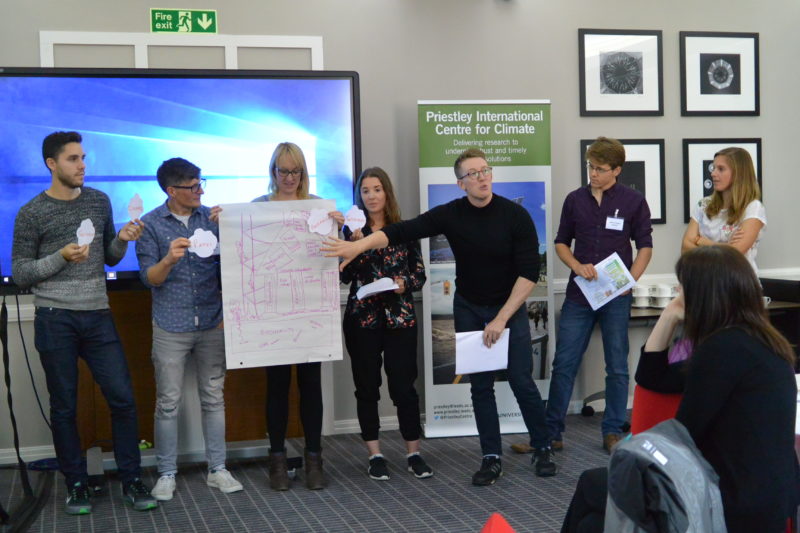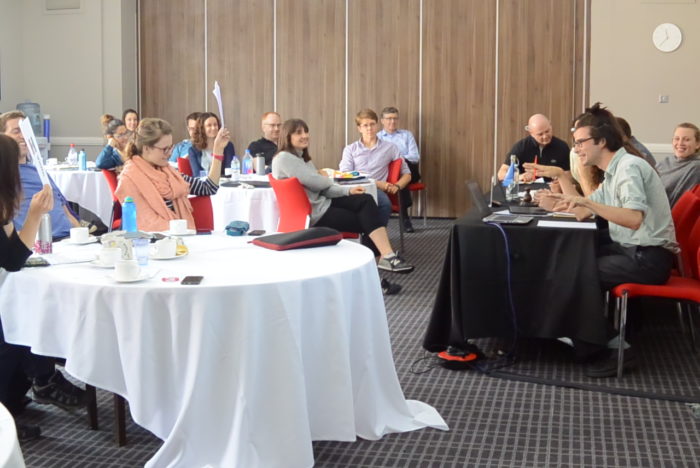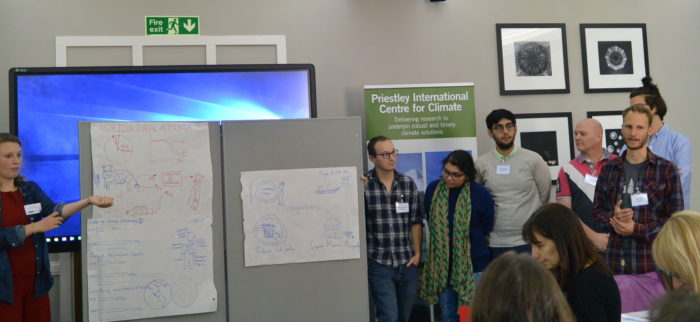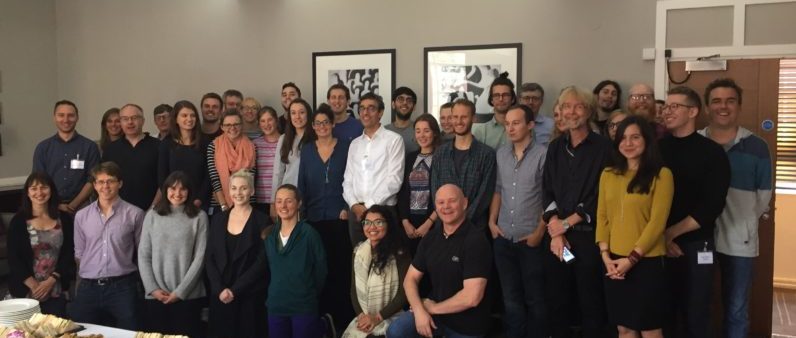Priestley course prepares lead authors of the future

“They mentioned being a reviewer, so I’m definitely going to look into that – I think it would be a really good starting point for to get into it,” said Sarah Gore of Cardiff University, packing up her bags as the MAPERS course on global scientific assessments came to a close.
Sarah, one of 30 environmental postgraduate and early career researchers that attended the three-day course, was buzzing with enthusiasm about the immersive introduction to expert assessments: “I thought the course was really good with regards to the skills that we learned – the data visualisation taught me a lot. It’s been really interesting.”
The final day of the course had ended on a high, with participation in a mock plenary session that the students, tasked with representing their allotted country’s interests, had thrown themselves into wholeheartedly, waving flags, grilling panellists and vetoing text until a compromise was reached.
“I really liked the interactive group sessions – especially the panel at the end,” said Sonja Felder, who had come from Newcastle University. She admitted that the plenary had been an eye-opener for her: “I think one of the big take away messages definitely was how hard it can be to reach agreement on the assessments and how it’s got to be phrased.”
Alice Carter-Champion of UCL concurred: “It was a really good insight into how much time and work it takes and how careful you have to be about the words that you choose. But, more generally, it was really interesting to learn about the current climate and how the process of how all the IPCC stuff goes in.”

The first of its kind
The NERC-funded short course, run by the Priestley International Centre for Climate at the University of Leeds (18-20 September 2017), was the first of its kind to introduce the key skills and knowledge required for making global scientific assessments. The course was devised for early career researchers, for whom getting a seat at the author table requires understanding how to develop the content and style of an assessment that is relevant and valuable to policy makers, as well as the political framing in which assessments operate.
The focus of MAPERS (Making Assessments for Policy for Environmental Research Scientists) was on how to undertake assessments for climate, air quality and ozone, and biodiversity and ecosystem services. Another aim for the course was to make the students think about what makes a good paper for use in assessments, to encourage them to produce papers that would be used in future assessments.
Training – a mix of seminars, skills-based exercises and group work – was delivered by lead authors for the IPCC, IPBES and WMO/UNEP ozone assessments, as well as experts in policy and communications, representing an international line up of high profile speakers.
Work commenced a month before the course, with participants being sent five papers from their chosen assessments area and being asked to produce a data visualisation to summarise the important findings and a paragraph of text assessing the papers, a process they saw through to drafting an executive summary as a group that was critiqued and submitted for peer review and ultimately presented at the plenary.
Students also received presentations on the context of assessments, how to assess scientific evidence and how to make effective data visualisations, as well as the use of uncertainty language, how plenaries are conducted and the needs of policymakers (with experts from UK government and Committee on Climate Change), culminating in the final-day mock plenary.

Lead authors of the future
As well as giving insights into the processes involved in expert assessments, the coursework also had immediate benefits for the researchers in terms of transferable skills. “It’s given me a different perspective when I write my reports, my papers,” said postgraduate Warwick Wainwright (University of Edinburgh). “Do I really need this sentence? Exactly what is it saying and is that a good enough reference to back it up? Because that’s what we’ve been doing the whole time.”
The course was designed to sow the seeds to inspire the next generation of potential lead authors and feedback from participants revealed that this had succeeded, with many wanting to do internships with the IPCC or in environmental policy, or expressing a desire to register as a reviewer or sign up as an author or get involved with policy assessments.
Participants said they had enjoyed the mix of lectures, learning and exercises and gained useful career advice. There were many complimentary remarks too about the trainers who, between them, brought first-hand experience of the range of assessments, as well as knowledge of the policymaking process and scientific communications. “Trainers were all utterly amazing. Breadth of knowledge and expertise and perspectives was great and really helpful” was a typical comment.
International line up
Trainers were Piers Forster, Director of the Priestley Centre (IPCC); Mat Evans, Professor of Atmospheric Chemistry Modelling at the University of York (International Global Atmospheric Chemistry Tropospheric Ozone Assessment Report steering committee); Keith Shine, Regius Professor of Meteorology and Climate Science at the University of Reading (IPCC, WMO); David Fahey, Director of the Chemical Science Division at NOAA (IPCC, WMO); Jan Fuglestvedt, Research Director at the Center for International Climate and Environmental Research (CICERO) in Oslo (IPCC, WMO, and Norwegian government climate advisor); Jolene Cook, head of the Climate Science team at UK government department BEIS; Steve Smith, former Head of Science at the Committee on Climate Change; Jan Minx of the Mercator Research Institute on Global Commons and Climate Change, Berlin, and the Priestley Centre (IPCC), and Lindsay Stringer, Professor in Environment and Development at the University of Leeds and also a member of the Priestley Centre (IPBES).
The value of introducing the global scientific assessment process to environmental researchers early in their careers was recognised by the trainers, too. Jan Fuglestvedt, who is Vice Chair of IPCC Working Group 1, said: “It’s important to have recruitment and new young researchers all the time at different levels, both by producing papers and by being reviewers and contributing later as authors to the process.”
Many of the students said how beneficial the teaching about working with policymakers had been for them. Jolene Cook, whose team provides scientific advice to policymakers, was extremely positive about the value of the course from her point of view, too: “It’s basically training the next generation of UK scientists to actually contribute to all these assessments. It’s good for the UK because it means we have really strong scientists going in who have a really good understanding of what to expect”.
Summer school for early career researchers
The Priestley Centre team hopes to expand on the MAPERS course in the future and is keen do it again, possibly as a residential summer school if funding can be obtained. There was a clear demand – we offered 30 places but more than 60 people applied – and students attended from universities from all around the UK. The positivity of the responses we received during and after the course has made us confident that it would be popular. One respondent wrote, “Please do this course again in the future for a new generation of scientists!”
The Priestley Centre is well placed to deliver further courses. We have an excellent track record of involvement with IPCC reports: the Centre’s director, Prof Piers Forster, was one of five lead authors from the University of Leeds on the Fifth Assessment Report (AR5, 2014) and is currently working on the IPCC’s Special Report on 1.5 Degrees along with our Priestley Chair in Climate Adaptation, Prof James Ford. Profs Tim Benton and Lindsay Stringer, are lead authors for an IPCC Special Report on Climate Change and Land, and Prof Stringer is also co-ordinating lead author for another UN global scientific assessment, the Intergovernmental Platform on Biodiversity and Ecosystem Services (IPBES).
Another IPCC veteran, Jan Minx, who is now Priestley Chair of Climate Change and Public Policy, summed up the MAPERS course and its value to early career researchers: “The opportunity to learn about how assessments like the IPCC work is of crucial importance and something they cannot get elsewhere, so from my perspective this is a very unique experience that should be repeated.”
Could it produce the lead authors of the future? Dave Fahey of NOAA (National Oceanic and Atmospheric Association) who came over from Boulder, Colorado, to deliver a keynote lecture for the course, was impressed. “I wouldn’t be surprised to see one or more of these at some of these international gatherings. They are incredibly capable. That’s what this shows, is just how talented a group of individuals like this who are interested in the science can be.”
Kate Lock, Communications Officer, Priestley International Centre for Climate
Further reading
Building bridges: Enhancing collaboration and multi-disciplinarity in the IPCC 6th assessment cycle: IPCC Working Group I Vice-Chair Jan Fuglestvedt writes about the importance of cross-disciplinary and cross-Working Group collaboration in the IPCC 6th assessment cycle

